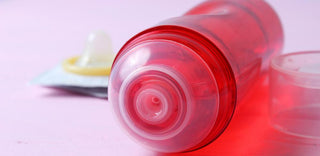The history of commercial, personal lubricants goes back to 1904 when KY patented KY Jelly as a medical device initially designed for surgery. KY and others started developing lubricants for personal use back in the early 2000s.
There are different types of intimate lubricants for various applications. There’s the best type of lube for dryness and the best type of anal lube, and even the best type of lube for conception.
With so many lubricants on the market for various purposes, it isn’t easy to know what to choose and answer the question — What type of lube should I use? There are many factors to consider, and we hope this blog will help answer most of your questions.
The most crucial function of lube is to enhance comfort and pleasure during sex and reduce the risk of injury and irritation due to friction, factors that can make sex a unique, fun-filled experience.
Table of Contents:
- Why Use Lube
- Improved Comfort During Sex
- Prolonging the Life of Condoms
- Lube for Enhanced Pleasure During Masturbation
- Ease of Use with Sex Toys
- Different Types of Lube
- How to Choose the Right Lube
- Slippery Tips for Using Lube
Why Use Lube
Improved Comfort During Sex
It’s essential to be comfortable in all things, shoes, underwear, work environments and even take-away choices; when we are comfortable, we relax and think about other things, like great sex.
Prolonging the Life of Condoms
There’s also a practical element to using lube, vaginal or anal dryness can cause discomfort and shorten the life of your condom. Friction can cause a condom to break, so by using lubricants, you prolong the life of your condom and, in turn, your enjoyment.
Lube for Enhanced Pleasure During Masturbation
Lubricant plays a part in masturbation by moisturising the skin and stopping it from becoming dry and chafed. If chafing happens, the body becomes desensitised from friction and can hinder or stop you from enjoying sex and reaching an orgasm.
Dry sex can be painful as friction causes micro-abrasions of the vaginal tissues. Lack of lubrication increases the risk of an STI, including HIV. It also leads to loss of all important lactobacilli which normally colonise the vagina, meaning a healthy vagina has a natural acidic pH. This acidity prevents the growth of other micro-organisms.
Having enough lubrication is vitally important for good sex and good sexual health (source 1 and source 2).
Anything called liquid silk has to be the best lubricant for solo activities — if you want some, click the link — Liquid Silk.
Additional benefits of water-based lubes:
- They do not contain as many chemicals as other types of lube.
- Studies show that using water-based lube significantly reduces the rate of condom breakage.
- WHO recommends the use of lubricant with a pH of 4.5 - compatible with the normal vaginal pH - and an osmolality below 1200 mOsm/kg. Water based lubes meet this recommendation.
Ease of Use with Sex Toys
The same is true for sex toy play; you need lube to help your toys do their thing. Sex toys are not self-lubricating and need a little help from the lube.
There are specific types of lubricants for toy play; water-based is generally the best type to use as it doesn’t degrade silicone or plastic — most sex toys, vibrators, and dildos are made from these materials.
Different Types of Lube
Water-Based Lube
Water-based lubricant is probably the most well known and utilised form of personal lubricant — many different brands make water-based lube, including Durex and Pasante.
These are some of the reasons water-based lube is so popular.
- Easy to clean up.
- Safe for use with most condoms and sex toys types.
- Non-staining and non-irritating.
- Better for those who are trying to conceive.
These are some of the water-based lube’s drawbacks.
- It may require frequent reapplication.
- Not suitable for water play.
Silicone-Based Lube
The second most popular lube is a silicone-based lubricant, and for a good reason — here is why silicone-based lube is so effective…
- Long-lasting and doesn’t dry out, so no need for reapplication
- Great for water play.
- Safe for use with any type of condoms.
- Silicone-based lube also spreads easily, and is especially good for women suffering from vaginal dryness or who have painful sex (source.)
These are some of the silicone-based lube’s drawbacks…
- Can damage silicone sex toys.
- It may be harder to clean up, some users find silicone-based lube a little 'greasy'.
Many brands make silicone-based lubricants, including Pjur, which makes Pjur Man Premium Extreme Glide Silicone Personal Lubricant or Pjur Light Silicone Personal Lubricant. Read more about Pjur lubes.
Oil-Based Lube
Oil-based lubes are more about whole body massage than water or silicone-based lubricants — here are some of the reasons we love oil-based lube…
- Long-lasting and moisturising.
- Great for massage and skin-to-skin contact.
Here are some reasons why oil-based lubes are less popular than water- or silicone-based lubricants…
- Not safe for use with latex condoms as they increase the rate of condom breakage.
- May increase the risk of vaginal candidiasis (thrush).
- Can stain fabrics.
- May clog pores.
You can buy oil-based lube from Sliquid — made with coconut oil for a truly tropical experience. Take care to choose one that does not contain parabens as this can cause vaginal irritation (source).
Hybrid Lubricant
Hybrid lube offers the best of both worlds, and many brands make hybrid lubricants designed to cover all bases. These brands include Roam, Loving Joy, Lubido, Sliquid, Skin Fusions, and Pjur.
Here are some of the reasons to choose a hybrid lube…
- Combines benefits of water-based and silicone-based lubes.
- Easy to clean up.
- Safe for use with condoms and most sex toys.
There aren’t many hybrid drawbacks, but frequent reapplication may be one of them.
Natural and Organic Lube
Customers usually purchase natural or organic lubricants because they have their eyes on the future; planet-conscious consumers who want a vegan or vegan-friendly product — here are some of the pros of this kind of lube.
- Made from natural ingredients.
- Free from harsh chemicals.
- Suitable for people with sensitivities or skin allergies.
Natural or organic lube can be more expensive, but it’s not always the case — Sliquid makes organic lube at a competitive price point.
What ingredients should you look to avoid in a lubricant?
- Chlorhexidine gluconate - kills lactobacilli
- Parabens - cause vaginal irritation, thought to be endocrine disruptors
- Cyclomethicone, cyclopentasiloxane, or cyclotetrasiloxane - all can cause uterine cancer and negatively affect fertility in animal studies
- Undisclosed flavourings or fragrances - these could be allergens, toxins or even carcinogens.
(Source.)
How to Choose the Right Lube
Consider your intended use (e.g., vaginal sex, masturbation, oral and anal sex, including sex toy play). The kind of sex you enjoy may need a specialist lube. It’s worth considering allergies, sensitivities, and personal likes and dislikes.
Consider the type of condom or toy material compatibility (latex vs non-latex condoms). Silicone toys and condoms fare better with a water-based lube.
Evaluate the desired consistency and longevity. Anal sex requires a thicker glide than oral sex, for instance.
Choose a lube with a pH of around 4.5. Most lubricants don't contain spermicide, but some have ingredients than can affect sperm function and survival - such as petroleum, parabens, propylene glycol, glycerol, silicone and Non-oxynol-9. If you are trying to conceive and are using a lubricant to make sex more pleasurable, you should take care to choose a sperm-friendly lubricant that does not contain any of these ingredients.
Slippery Tips for Using Lube
- Start with a small amount and add more as needed.
- Apply lube to both partners or toys.
- Reapply as necessary during the activity.
- Store lubricants in a cool, dry place.
- Before use, always apply a little of the lube to non genital skin first and see what happens if you leave it overnight. This is especially important if you think you have sensitive skin or allergies. You must discontinue use immediately if you notice any reaction (source).
It’s worth checking out the reviews before you purchase, and once you have your items, please read the instructions — Having the last word is Tingle Lube must be tried to be believed.





